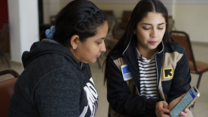Authors: Clay Westrope (Groundswell Global Research) with the support of Chloë Whitley, Andrew Meaux and Reynaldo Rodrigues of the IRC
ICTs offer highly diverse and/or mobile populations the opportunity to access targeted, critical, up-to-date information without having to visit a centralised location. The prevalence of ICT coverage provides humanitarian actors with the opportunity to facilitate two-way communications between dispersed crisis-affected people and humanitarian service providers, while providing crisis-affected people with the information they need to make informed decisions about how to meet their needs through access to services.
Thus far, such technologies have been used by the IRC and partners in Lebanon and Europe as part of the refugee and migrant crisis that has unfolded in these two locations, predominately stemming from large population flows out of Syria and other affected countries. The two platforms which have been developed and tested to date are ServiceInfo and Refugee.Info, both of which comprise a suite of features and functions aimed at addressing the needs of affected populations in urban settings.
This report outlines the findings from an assessment that was carried out between September 2016 and April 2017 of ServiceInfo and Refugee.Info, drawing on perspectives and reflections from stakeholders across the humanitarian spectrum, including affected populations themselves. The objectives of this study were to describe how these platforms work, provide recommendations for how they might be improved, and explore how these platforms might become more sustainable over time. The findings within this report are intended for both internal IRC audiences as well as external audiences within the sector interested in ICT solutions for affected populations in urban crises.



